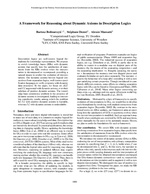A Framework for Reasoning about Dynamic Axioms in Description Logics
From International Center for Computational Logic
A Framework for Reasoning about Dynamic Axioms in Description Logics
Bartosz BednarczykBartosz Bednarczyk, Stéphane DemriStéphane Demri, Alessio MansuttiAlessio Mansutti
Bartosz Bednarczyk, Stéphane Demri, Alessio Mansutti
A Framework for Reasoning about Dynamic Axioms in Description Logics
In Christian Bessiere, eds., Proceedings of the 29th International Joint Conference on Artificial Intelligence and the 17th Pacific Rim International Conference on Artificial Intelligence (IJCAI 2020), ijcai.org, 1681--1687, July 2020. International Joint Conferences on Artificial Intelligence
A Framework for Reasoning about Dynamic Axioms in Description Logics
In Christian Bessiere, eds., Proceedings of the 29th International Joint Conference on Artificial Intelligence and the 17th Pacific Rim International Conference on Artificial Intelligence (IJCAI 2020), ijcai.org, 1681--1687, July 2020. International Joint Conferences on Artificial Intelligence
- KurzfassungAbstract
Description logics are well-known logical formalisms for knowledge representation. We propose to enrich knowledge bases (KBs) with dynamic axioms that specify how the satisfaction of statements from the KBs evolves when the interpretation is decomposed or recomposed, providing a natural means to predict the evolution of interpretations. Our dynamic axioms borrow logical connectives from separation logics, well-known specification languages to verify programs with dynamic data structures. In the paper, we focus on ALC and EL augmented with dynamic axioms, or to their subclass of positive dynamic axioms. The knowledge base consistency problem in the presence of dynamic axioms is investigated, leading to interesting complexity results, among which the problem for EL with positive dynamic axioms is tractable, whereas EL with dynamic axioms is undecidable. - Weitere Informationen unter:Further Information: Link
- Projekt:Project: DeciGUT
- Forschungsgruppe:Research Group: Computational LogicComputational Logic
@inproceedings{BDM2020,
author = {Bartosz Bednarczyk and St{\'{e}}phane Demri and Alessio Mansutti},
title = {A Framework for Reasoning about Dynamic Axioms in Description
Logics},
editor = {Christian Bessiere},
booktitle = {Proceedings of the 29th International Joint Conference on
Artificial Intelligence and the 17th Pacific Rim International
Conference on Artificial Intelligence (IJCAI 2020)},
series = {ijcai.org},
publisher = {International Joint Conferences on Artificial Intelligence},
year = {2020},
month = {July},
pages = {1681--1687},
doi = {10.24963/ijcai.2020/233}
}
